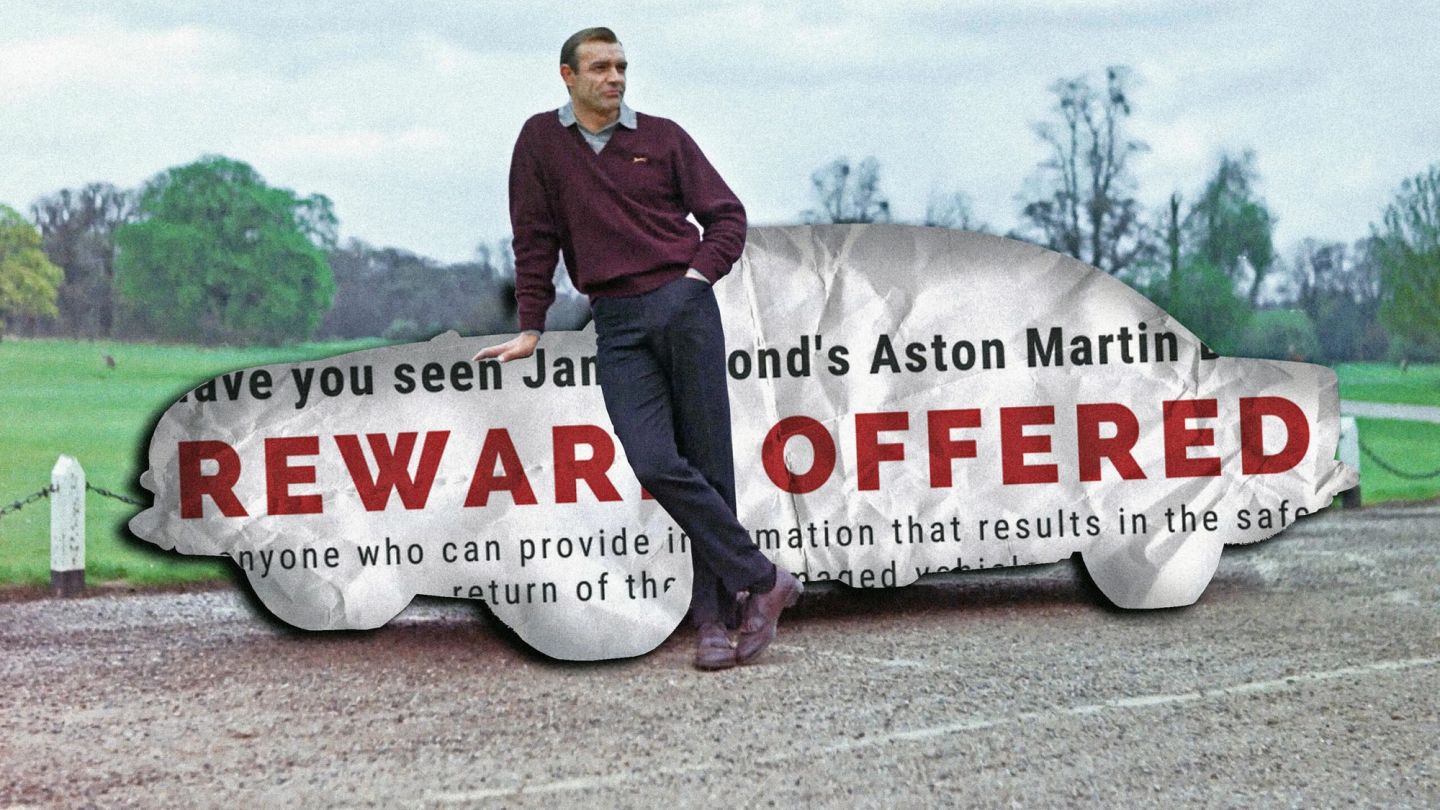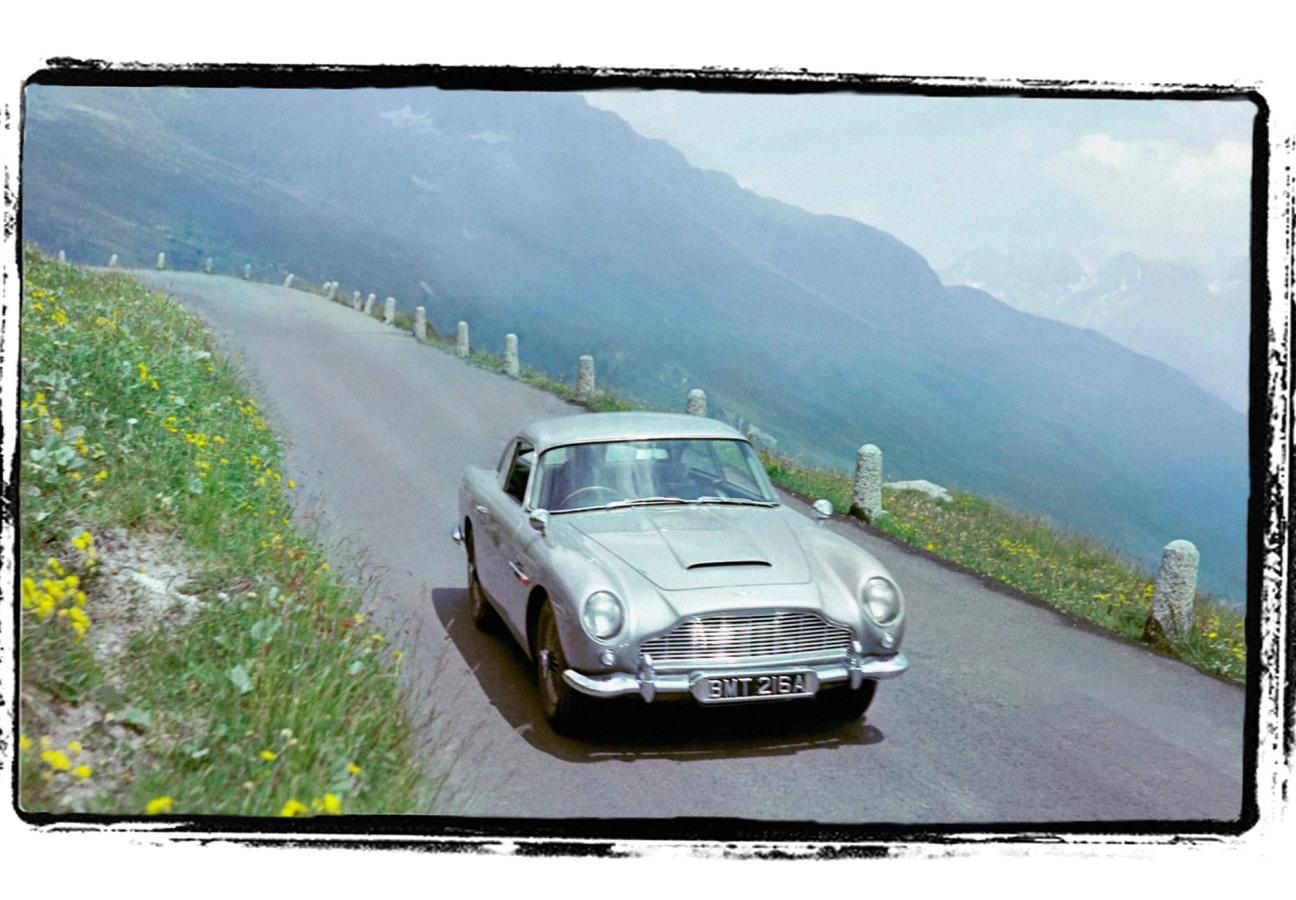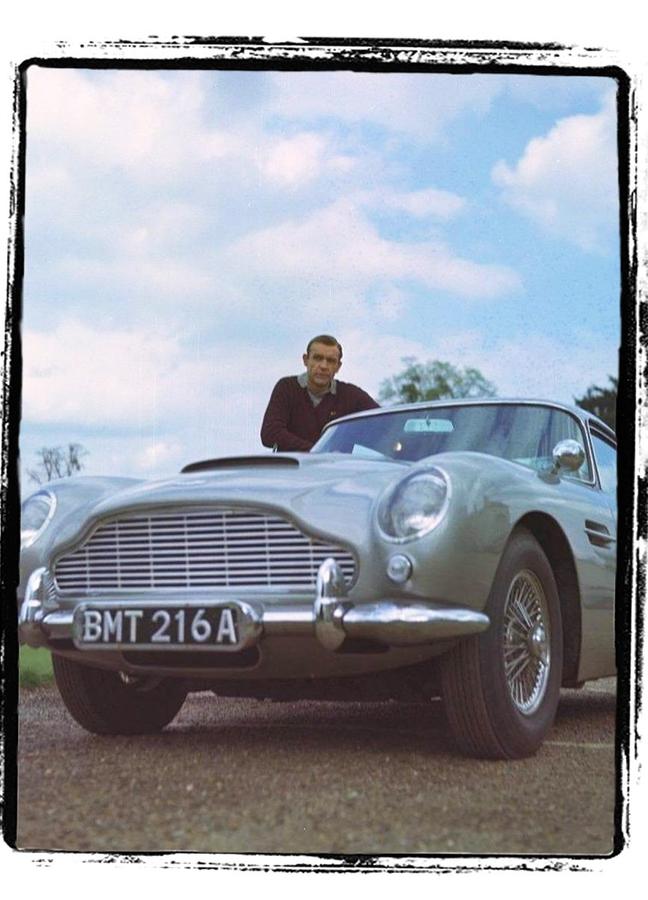

Words: Jonathan Wells
When James Bond collects a new set of car keys, a certain amount of high-octane, hair-raising drama is to be expected. Over the years, 007 has careened along coastal roads, power-drifted through the Vatican, barrel-rolled over rivers and even manned an invisible motor.
But the derisible, disappearing Aston Martin Vanquish Pierce Brosnan drove in Die Another Day has nothing on Sean Connery’s 1963 Aston Martin DB5, a car that featured in both Goldfinger and Thunderball. Because, in 1997, Bond’s original Aston was stolen from a secure hangar in Florida — and truly did vanish.
Until, that is, earlier this week. After 25 years unaccounted for, Bond’s iconic DB5 (valued at over £18.5 million) has been found. Since its disappearance from that airport in Boca Raton a quarter-century ago, hardly a whisper had been heard of its whereabouts. And yet that didn’t stop Christopher Marinello — a lawyer and the founder of Art Recovery International — from tracking down the car to its current location; a “private setting” somewhere in the Middle East.
“I’ve been working on the case since 2007,” Marinello tells Gentleman’s Journal, “and will continue to do so until the car is recovered, or the title dispute resolved in an amicable, discreet fashion. We don’t know how the car got to where it is currently, but we do have a solid lead and strong verification. It is time for someone to suggest a meeting to resolve this dispute.”
And Marinello, without question, is the man for the job. Since his agency began its work in 2013, the Venice-headquartered Art Recovery International has recovered over $500 million in masterpieces, from artists as distinctive and disparate as Matisse, Rodin and El Greco. Bond’s DB5, a car designed by the Italian coachbuilder Carrozzeria Touring Superleggera, is just the latest sensation he’s smoked out.
“I’m a law and order guy,” says Marinello, matter-of-factly. “I don’t like criminals — whether Nazis, looters, thieves or buyers of stolen items who didn’t ask any questions. Taking something that doesn’t belong to you, or hiding it from the rightful owners, is an incredible violation. I recognise that ‘good faith buyers’ exist, who may have no knowledge of the original crimes. But still, I expect such individuals to maintain that good faith and resolve the title issues amicably – without the need for litigation”.
“I’ve been working on the case since 2007...”
This problem, of true ownership, will likely arise with the 1963 DB5, as Marinello believes the current owners were not aware it was stolen when they bought it. But, before the art detective thrashes out the finer details of the case, here’s how the film-famous grand-tourer found its way from Switzerland’s cinematic Furka Pass to a Floridian airport in the first place…
After appearing in both Goldfinger (1964) and Thunderball (1965), EON Productions threw a dust sheet over the iconic car — opting for the nippier Toyota 2000GT for the next Bond film, You Only Live Twice (1967). The filmmakers instead returned the DB5 to Aston Martin’s Newport Pagnell facility, where it was stripped of its rotating number plates, tyre slashers and every other Q-Branch gadget beneath its bonnet.

It was promptly sold, with 50,000 miles on its odometer, to collector Gavin Keyzar. An avid fan and canny businessman, Keyzar reinstalled the spy car’s gadgets — at his own expense — and sold the DB5 to a Utah-based entrepreneur named Richard Losee. For 15 years, Losee kept the car under lock and key in his hometown of Provo, just south of Salt Lake City. But, by 1986, he was looking to sell his slice of movie memorabilia, and tasked RM Sotheby’s with finding a buyer.
Peter Haynes, a motoring enthusiast and the current Marketing Director of RM Sotheby’s, reveals that any car associated with the Bond franchise automatically becomes a huge hit for the auction house. Cars driven by actor Steve McQueen come close, he adds, but there’s nothing like Bond.
“As a movie franchise, Bond is as strong as it gets from a car perspective,” he tells Gentleman’s Journal, “as the cars always form such a central component of the storyline. When coupled with the overriding status that these movies hold, as iconic pieces of cinema history, the cocktail is highly compelling”.
Back in 2010, RM Sotheby’s handled the sale of another official Goldfinger Aston Martin DB5. American businessman Harry Yeaggy paid £2,912,000 for the vehicle and, as Haynes remembers, the sale caused quite the stir.
“It was crazy,” he says. “There’s a lot of confusion around the Goldfinger and Thunderball DB5s – there were a few. Cars with gadgets, cars without gadgets. Cars that appeared on screen and cars that were created for promotional purposes. And of course, cars that are complete fakes or copies, created in the years since. The car we sold in 2010 was the standard ‘fast road car’ used in Goldfinger and later retrofitted with the gadgets and used onscreen in Thunderball. It’s the real deal.”

It’s a similar story with the 1963 DB5 that resurfaced in the Middle East this week. Back in 1986, after Gavin Keyzar restored the car to its former gadget-laden glory, RM Sotheby’s sold it for a handsome $250,000. It went to real estate mogul Anthony V. Pugliese III — a man who moved the car to Florida, where he maintained a collection of pop culture artefacts (a trove that already included Christopher Reeve’s Superman costumes, Harrison Ford’s Indiana Jones bullwhip and the black felt Bowler hat worn by henchman Oddjob in Goldfinger).
Peter Haynes says that many collectors around the world would have been clamouring for the car — but that it would have been most attractive to either a hardcore car enthusiast or a movie memorabilia collector. “And, of course,” he adds, “Bond itself also attracts a very dedicated following.”
It would appear so. As, in the dead of night on June 18th, 1997, Bond’s original Aston Martin DB5 was stolen from Pugliese’s hangar in Boca Raton airport. The thieves tore a secure gate from its hinges, cut the alarm and fastened a chain to the car’s axel, before dragging it away. Insurance company Grundy Worldwide paid out $4.2 million to Pugliese, and offered $100,000 to anyone with information that could lead to the car’s recovery.
But the car remained lost — somehow making its way to the Middle East in the 25 years that followed. And, while Marinello’s discovery marks a huge turning point in the saga of the stolen DB5, the founder of Art Recovery International explains that the current ‘owner’ may still challenge the Pugliese estate if they bought the car ‘in good faith’.
“The world is getting smaller, and mega-collectors have similarly-sized egos,” says Marinello. “But word gets around — and you can’t hide stolen property forever. At some point, for the sake of your reputation, and that of your family, you need to resolve the issue. What kind of person leaves a nightmarish title dispute to their children? And that goes for stolen and looted objects beyond the Aston Martin DB5.
“Because possessors of stolen artwork always complain when they get sued or face law enforcement action,” he adds. “They hate to see their name made public. But I always offer my adversaries an opportunity to come forward and resolve the matter quietly. The smart ones take me up on the offer. And those who hide, or continue to fight, will eventually be called out.”
The car has been authenticated by an anonymous, trusted third party; confirmed as the original Chassis No.DP216/1 used as the main car in those early Bond films, not one of the replicas built for publicity or long shots around the same time. And the next step, Marinello says, is to sit down with the parties involved, and hash out what happens next.
“I honestly believe that the current possessor had no knowledge of the theft at the time they acquired the car,” he says. “However, I do believe that they do now know, and need to reach out and contact me for a meeting. And I will guarantee anonymity and resolve the matter, as we always do, in a discreet fashion.”
Want more scandal? Here’s the true story behind House of Gucci…
Become a Gentleman’s Journal member. Find out more here.


